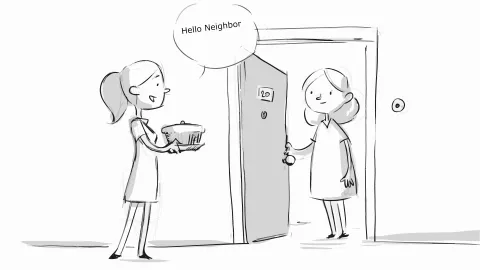“Hello Neighbor”

By A.G. Akers
A wise teacher was talking to a gathering of people when a lawyer stood up to test his knowledge. He asked, “How can I live forever?” The teacher responded by asking him what is written in the law and if he has read the law. Knowing the teacher was a religious man he quoted from the law of Moses, “You shall love the Lord your God with all your heart and with all your soul and with all your strength and with all your mind, and your neighbor as yourself.” The wise teacher affirmed that he had answered correctly and told the lawyer, if he would do it, he would live. The lawyer wasn’t satisfied and still wanted to test the teacher so he asked him another question, “And who is my neighbor?”
When I was growing up in a rural community in the ’70s and ’80s, if we had a new neighbor move into the community, my mother would bake a pie or some other food item to take to them and welcome them into the community. This act of kindness was a way for us to welcome our new neighbors into the community and find out a little more about them. Sometimes these new neighbors would need help with moving in, repairing something around their homestead, or as they were getting things settled, would accept help with some yardwork. My father would often take us kids to help tend to these matters. In these simple gestures my parents were teaching me, as an impressionable adolescent, to be a good neighbor.
Are we doing the same today? I hear a lot of talk about new people moving into our rural community and I am not impressed with a lot of it. I hear about how new neighbors are moving in and trying to change things. I also hear and read on social media how we are losing our close knit community to outsiders. Have we made an effort to meet these “furners” (foreigners) or are we just thinking of ourselves?
I attend a local church and there is a lot of emphasis on sharing the good news and being on mission. As I think about what that looks like in the religious community I often wonder if God is just bringing those opportunities to us in the form of new neighbors. Now, I could offer all kinds of opinions on how to be a better neighbor. I could also give many suggestions on how to take advantage of the opportunities before us to have good community, but the wise teacher in the opening story gives a much better illustration than I could ever give.
The teacher said there was this man traveling to a certain place and some bad people decided to waylay (beat and rob) him. This religious man was going down the same road and saw him but decided it was too dangerous and kept going. Another man who had political aspirations also saw the man on the road and passed by on the other side refusing to help the poor man in obvious need. Then a man who looked, acted, and believed in things that were much different from everyone else, so much so that people in the local community didn’t want anything to do with him, decided to stop. He had compassion on the man, treated his wounds, and took him to get appropriate care in the nearest town. Why he even paid for a room for him to stay in until he was well enough to travel home!
Then the teacher asked the lawyer which of these he thought was a good neighbor to the man in need. I’m going to leave it up to you to decide the answer to that one just as the lawyer had to decide.
If you do want to know the response of the lawyer you can look it up in the most popular collection of stories in the world, the Bible. It is in one of the books of the Bible, Luke, in the 10th chapter.
I have paraphrased that story for the purpose of giving thought to action, or possibly inaction. There are many questions here we can ask ourselves about being a good neighbor, even loving our neighbor, in modern society. I guess the most poignant insight into our attitude toward neighbors in general was also given by the master teacher, Jesus, when He said, (I’m paraphrasing once again) treat others the way you yourself would want to be treated.
Remember, not all needs are physical, and we don’t really know a person until “we’ve walked a mile in their shoes.” Choose to emulate the good teacher today by stopping to say “hello neighbor” and listening to their response.
- Log in to post comments